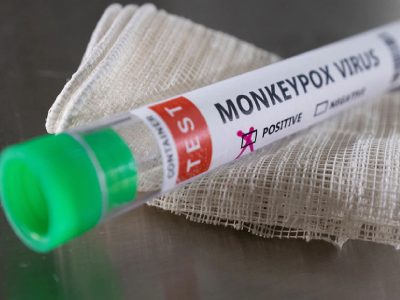Monkeypox Scare in India: Govt Issues Advisory to States and UTs on Preventing Mpox Spread; Check Dos and Don'ts
By Lokmat English Desk | Updated: September 26, 2024 18:54 IST2024-09-26T18:53:55+5:302024-09-26T18:54:26+5:30
Health secretary Apurva Chandra on Thursday, September 26, has issued an advisory to all States and Union Territories (UTs), ...

Monkeypox Scare in India: Govt Issues Advisory to States and UTs on Preventing Mpox Spread; Check Dos and Don'ts
Health secretary Apurva Chandra on Thursday, September 26, has issued an advisory to all States and Union Territories (UTs), urging them to implement key public health measures to prevent and minimize the spread of Mpox, also known as monkeypox, in India.
According to the health ministry directions, it is important to raise public awareness about the disease as it is transmission modes it will need to timely reporting. Preventive measures to curb further spread should be taken timely. "All States/UTs are requested to undertake appropriate activities to make communities aware about the disease, its modes of spread, need/importance of timely reporting and preventive measures. It is crucial that any panic amongst the masses is prevented. Identification of isolation facilities in hospitals for taking care of both suspect and confirmed cases, availability of required logistics and trained human resources in such facilities and augmentation plan," reads the advisory.
Health Secretary Apurva Chandra issues an advisory to the States and Union Territories regarding key public health actions that are required to be undertaken to prevent/minimize the risk of further spread of Mpox in India.
— ANI (@ANI) September 26, 2024
"All States/UTs are requested to undertake appropriate… pic.twitter.com/nHvxbP0JpH
Dos:
Increase public awareness: States and UTs are urged to actively engage in making communities aware of Mpox, its symptoms, transmission methods, and the importance of timely reporting.
Isolate suspected cases: Any suspected Mpox case must be isolated immediately, with stringent infection prevention measures in place.
Set up isolation facilities: Hospitals must be equipped with adequate isolation facilities for both suspected and confirmed cases, with proper logistics and trained staff.
Symptomatic treatment: Follow current treatment guidelines, focusing on symptomatic management.
Send samples for testing: Ensure samples from patients with suspected Mpox symptoms are sent to designated labs. For positive cases, a sample should be sent to ICMR-NIV for genome sequencing to identify the Mpox clade.
Strengthen diagnostic capabilities: Utilize ICMR-approved labs and PCR kits to ensure early detection and containment of the virus.
Monitor public health infrastructure: Senior health officials should frequently review public health preparedness at both state and district levels.
Also Read | Mpox In India: Kerala To Issue Revise Guidelines After State Confirms First Case Of Clade1 Variant.
Don'ts:
Avoid panic: Prevent mass panic by ensuring proper public communication and clarity on preventive measures.
Do not delay reporting: A delay in reporting suspected cases could lead to further spread, so ensure swift reporting to health authorities.
Avoid unnecessary crowding in facilities: Only admit cases with symptoms or those needing isolation to avoid overburdening health facilities.
Do not overlook mild cases: All suspected cases, even mild ones, must be tested and isolated if necessary to prevent unnoticed transmission.
Open in app